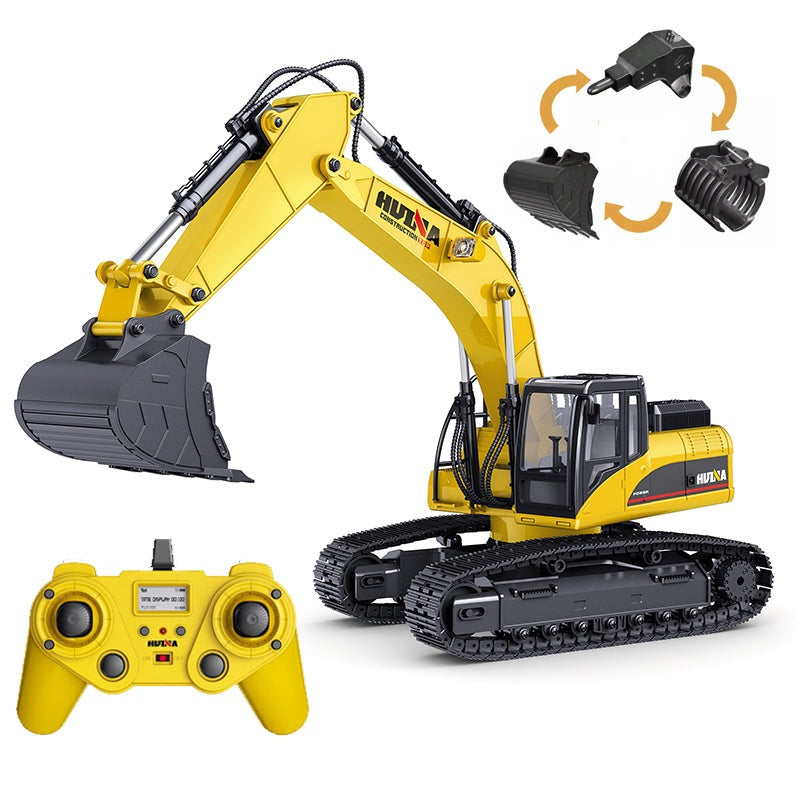Understanding Exactly How Excavator Works and Its Effect On Performance
Excavators play an essential function in building and mining operations, counting on a complicated interaction of hydraulic and mechanical systems. Their capability to perform a variety of tasks depends upon both their layout and the innovation integrated within. Recognizing these components can considerably affect operational performance and efficiency. As innovations proceed to improve the industry, one should take into consideration just how these modifications will affect future techniques and efficiency.
The Basics of Excavator Mechanics

The Function of Hydraulic Solutions in Excavators
At the heart of excavator procedure lies the hydraulic system, which plays a crucial duty in powering the maker's functions and motions. This system utilizes pressurized hydraulic liquid to transfer power, making it possible for various activities such as excavating, moving, and training. By utilizing the principles of hydraulics, excavators can carry out jobs with exceptional accuracy and force, enhancing overall functional efficiency.The hydraulic system is composed of essential parts, consisting of shutoffs, pumps, and cyndrical tubes, which interact to regulate the circulation and direction of the fluid. When the operator engages the controls, the hydraulic fluid is directed to specific cylinders, translating the driver's commands right into physical activity. This device enables smooth and responsive actions, which are necessary in building and construction and excavation atmospheres. double e volvo rc excavator. The efficiency of the hydraulic system straight impacts the productivity and convenience of the excavator, making it a crucial aspect in modern excavation procedures
Secret Elements of an Excavator
Understanding the vital components of an excavator is crucial for grasping exactly how this powerful machine operates. An excavator contains several substantial elements, including the undercarriage, house, arm, bucket, and boom. The undercarriage gives security and movement, often featuring wheels or tracks to navigate different surfaces. The house consists of the engine and hydraulic systems, allowing the driver to manage motion and power the equipment. The boom extends from your house, allowing vertical reach, while the arm attaches to the container, helping with digging and lifting operations.Additionally, the cab houses the driver, outfitted with controls for exact maneuvering. Each of these parts plays an essential role in the excavator's general functionality, adding to its efficiency and efficiency on building sites. Comprehending these components assists in keeping and maximizing excavator performance, making sure tasks are completed safely and effectively.
Accessory Versatility and Its Benefits
Attachment flexibility is an essential facet of excavators, enabling operators to change in between numerous devices tailored for certain jobs. This flexibility not only boosts work performance yet additionally contributes to cost-effectiveness by minimizing the requirement for numerous equipments. Understanding the different kinds of attachments offered can substantially influence the total efficiency and performance of an excavator on task sites.
Sorts of Attachments
While excavators are mostly acknowledged for their digging capacities, their true versatility lies in the broad selection of add-ons offered. These add-ons improve the excavator's functionality, permitting it to perform various tasks beyond excavation. Common add-ons consist of containers (for excavating and scooping), hydraulic thumbs (for comprehending products), and augers (for piercing openings) Grapples are used for moving and dealing with debris, while rippers can separate difficult surfaces. Other specialized add-ons, such as trenchers and plows, make it possible for excavators to adapt to particular job needs. This diversity not just boosts the machine's energy across different fields, including construction, landscape design, and demolition, but also enables drivers to tailor their tools to fulfill specific task demands successfully.
Increased Task Performance
Maximizing job effectiveness is a primary advantage of making use of numerous excavator attachments. Various accessories allow an excavator to do numerous jobs without requiring to change tools, saving important time and labor. For example, making use of a hydraulic hammer can damage concrete while a container add-on can excavate dirt, enabling a smooth process. This versatility lowers downtime related to devices adjustments and enhances efficiency on-site. In addition, specialized attachments improve accuracy in jobs such as grading or landscape design, resulting in greater top quality outcomes. The capacity to adjust to various task requirements not only improves procedures yet also reduces the requirement for extra equipment, making sure that jobs are finished promptly and properly. In general, add-on versatility substantially adds to boosted work performance in excavation job.
Cost-Effectiveness and Adaptability
Cost-effectiveness is a substantial benefit of making use of versatile excavator accessories. These add-ons permit a solitary excavator to perform numerous tasks, reducing the demand for additional machinery and labor - double e volvo rc excavator. By switching between containers, hammers, and grapples, operators can take on numerous jobs, from digging to demolition, therefore making the most of equipment application. This flexibility not only decreases functional costs yet likewise decreases downtime connected with changing tools. In addition, the capability to customize excavators with specialized accessories enhances Clicking Here performance, as they can effectively this hyperlink deal with varied jobs according to job demands. To conclude, the mix of cost-effectiveness and convenience in excavator accessories adds to enhanced functional effectiveness and source allowance in construction and excavation jobs

Advanced Innovation in Modern Excavators
Modern excavators are progressively geared up with advanced modern technology that changes excavation procedures. Automation simplifies procedures, while improved fuel performance minimizes operational prices. Furthermore, clever control systems boost accuracy and security, marking a significant evolution in excavation devices.
Automation in Excavation Processes
As excavation innovation advances, automation has actually emerged as an essential component in boosting efficiency and accuracy on job websites. Modern excavators are geared up with advanced automated systems that promote tasks such as grading, excavating, and trenching with very little driver intervention. These systems make use of sensors, GPS, and equipment discovering algorithms to ensure precise positioning and depth control, considerably reducing the margin for mistake. Additionally, automation enables operators to concentrate on strategic decision-making instead of hand-operated controls, causing enhanced efficiency in general. Such developments not only simplify process yet likewise improve safety by lessening human mistake in complex operations. As a result, the assimilation of automation in excavation processes represents a substantial advancement in building modern technology, driving the market in the direction of better efficiency and efficiency.
Boosted Fuel Effectiveness
Advancements in modern technology have also caused significant improvements in fuel efficiency for contemporary excavators. Modern devices are geared up with advanced engines that enhance power output while minimizing fuel consumption. These engines utilize ingenious combustion innovations, such as turbocharging and direct fuel shot, to improve performance and efficiency. Additionally, lightweight products in building and construction lower total weight, permitting less power expenditure during operation. The introduction of variable speed controls allows operators to change engine performance according to specific jobs, better decreasing fuel use. Consequently, these improvements not only reduced functional expenses however also add to environmental sustainability by decreasing discharges. In general, enhanced gas effectiveness in excavators is an essential development that bolsters performance and economic viability in the building and construction market.
Smart Control Equipment
While operators browse significantly complex work sites, wise control systems in excavators have arised as important devices for improving effectiveness and precision. These advanced modern technologies make use of formulas and sensors to check various parameters such as load weight, surface problems, and functional efficiency. By instantly adjusting hydraulic functions, smart systems maximize maker performance, resulting in boosted productivity and minimized wear on parts. In addition, operators take advantage of user-friendly user interfaces that give real-time feedback and diagnostics, enabling educated decision-making. This integration of modern technology not just enhances procedures however also lessens human mistake, contributing to more secure workplace. As the building and construction site link sector remains to develop, clever control systems will certainly play a crucial function fit the future of excavator effectiveness and effectiveness.
Enhancing Operational Effectiveness With Excavators
Excavators play a crucial function in improving functional efficiency across numerous building and construction and excavation jobs. Their flexibility enables multiple tasks, including excavating, training, and material handling, which simplifies operations and minimizes the need for additional tools. With effective hydraulic systems, excavators can do heavy-duty tasks with precision, substantially lowering the time required to complete projects. The combination of sophisticated modern technology, such as general practitioner and automated controls, further maximizes their procedure, making it possible for operators to attain higher accuracy and reduce material waste. Additionally, modern-day excavators are created to eat less fuel and decrease exhausts, adding to both expense financial savings and environmental sustainability. By using excavators successfully, building teams can improve productivity, fulfill job deadlines, and boost general website administration. This multifunctionality and efficiency make excavators essential devices in the contemporary building and construction landscape.
The Future of Excavators in Building and Mining Industries
As the construction and mining markets evolve, the future of excavators is positioned for significant makeover driven by technical advancement and altering functional demands. Advances in automation and expert system are improving excavator capabilities, enabling for boosted accuracy and efficiency in operations. Independent excavators are arising, decreasing the demand for human intervention and minimizing the danger of accidents.Moreover, the integration of telematics and IoT innovation allows real-time tracking of equipment efficiency and anticipating maintenance, enhancing uptime. Eco-friendly styles, including hybrid and electric designs, are acquiring grip, straightening with sustainability goals within the industry.Additionally, using advanced materials and lighter styles enhances gas efficiency while keeping performance criteria. As these trends progress, excavators will play a crucial duty in fulfilling the enhancing needs for productivity and safety and security in construction and mining, eventually transforming functional landscapes.
Regularly Asked Inquiries
Exactly How Do Weather Condition Problems Impact Excavator Performance?

Weather conditions greatly influence excavator efficiency, as rain and mud can hinder grip and stability, while extreme temperature levels might impact hydraulic systems. Operators needs to adjust to these variables to assure perfect capability and security throughout procedures.
What Precaution Should Operators Comply With While Utilizing Excavators?
Precaution for excavator operators consist of using appropriate individual safety equipment, performing pre-operation examinations, guaranteeing proper interaction with ground employees, keeping a secure range from overhanging dangers, and adhering to well-known functional protocols to stop accidents.
Exactly How Usually Should Excavators Be Kept for Optimum Performance?
Excavators should be kept regularly to ensure peak performance, typically every 250 operating hours or as defined by the manufacturer. Routine checks boost integrity, stop unforeseen break downs, and extend the lifespan of the devices.
What Is the Typical Life-span of an Excavator?
The average lifespan of an excavator usually varies from 10,000 to 15,000 hours of operation. Aspects influencing durability include upkeep practices, operating conditions, and the high quality of the equipment itself, influencing total productivity and efficiency.

Can Excavators Operate on Uneven Terrain Effectively?
Excavators can operate properly on irregular terrain due to their expressed layouts and adjustable tracks. These attributes allow them to maintain security and traction, enabling efficient procedure in challenging environments commonly come across in building and landscape design projects. Each of these components plays an important role in the excavator's total capability, adding to its effectiveness and efficiency on construction sites. Making the most of job performance is a main advantage of making use of numerous excavator attachments. While operators navigate progressively complicated task sites, smart control systems in excavators have actually emerged as essential tools for enhancing performance and accuracy. Excavators play a crucial role in improving functional effectiveness across different building and construction and excavation tasks. Advances in automation and fabricated knowledge are reshaping excavator capabilities, permitting for boosted precision and effectiveness in procedures.